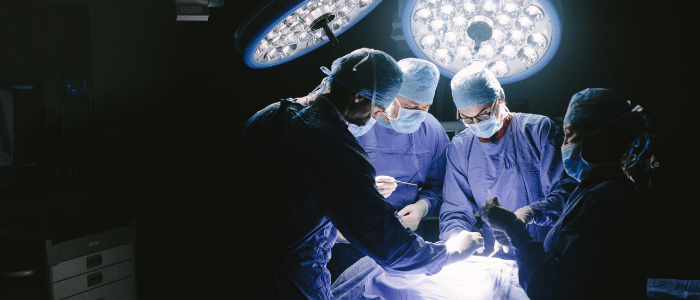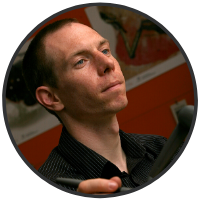Panel discussion: 3D printing in surgery and the operating room of the future

Hosted by 3DMedNet and 3DMedLIVE, this 1-hour live virtual roundtable panel discussion will explore some of the biggest questions surrounding applications of 3D printing in surgery, addressing the future of innovation in surgery, regulation and validation, funding and the practicalities of adoption into the clinic.
3D printing has already provided many innovations in surgery: from personalized scaffolds and implants, to informing surgical planning and patient consent. While many advances have been made already, there is still so much potential for the technology to improve patient care and surgical techniques.
As the future of surgery steers towards a personalized patient care dynamic, the use of 3D printing in surgery has already been shown to reduce procedure times, lower the costs associated with complex procedures and improve surgical outcomes as complications are anticipated, prepared for or negated altogether. But where are we now with 3D printing technologies in the operating room, and what remains to be seen as 3D technologies shape complex surgical strategies?
Hosted by 3DMedNet and 3DMedLIVE, this 1-hour live virtual roundtable panel discussion will explore some of the biggest questions surrounding applications of 3D printing in surgery, addressing the future of innovation in surgery, regulation and validation, funding and the practicalities of adoption into the clinic.
This webinar was recorded on 3 December 2020.
Topics for discussion:
- Proving the case for 3D printing in surgery: the practical use of 3D-printed preoperative models
- The patient’s perspective: working with patients to achieve patient-centric care
- The regulated reality of 3D-printed models, implants, materials and crucial validation steps
- Tandem tech: the use of 3D printing with 3D technologies (VR/AR) for optimal surgical outcomes
- The future of 3D printing in surgery and its role in the operating room of the future
Speakers:
 Amy Alexander
Amy Alexander
Senior Biomedical Engineer
Mayo Clinic (MN, USA)
Amy Alexander is a Senior Biomedical Engineer in the Mayo Clinic Department of Radiology’s Anatomic Modeling Lab in Rochester. In her role, Alexander converts 2D radiological images into 3D models and patient-specific surgical cutting guides. These life-size, patient-specific models and guides help surgeons from different specialties prepare for complex procedures. Additionally, these 3D prints form a communication bridge for patients regarding their personal surgical plan. Alexander holds a Bachelor of Science in Biomedical Engineering from the Milwaukee School of Engineering (WI, USA) and a Master of Science in Engineering Management from the Milwaukee School of Engineering Rader School of Business. Alexander has served on the SME Medical 3D Printing Workgroup (MI, USA) for over 3 years, is a member of the Radiological Society of North America’s 3D Printing in Medicine Special Interest Group (IL, USA) and is certified in Additive Manufacturing through SME. Alexander is an active member of Radiological Society of North America, Healthcare Information and Management Systems Society, and SME.
 Dominic Eggbeer
Dominic Eggbeer
Professor of Healthcare Applications of Design
PDR, Cardiff Metropolitan University (UK)
Dominic Eggbeer is a Professor of Healthcare Applications of Design at PDR, Cardiff Metropolitan University. His research focuses on the design and development of personalized medical devices, applying his knowledge to surgical implants, facial prosthetics, dental devices and other areas of rehabilitative medicine.
In addition to his academic research, he manages a small, ISO 13485 compliant commercial team in the design of patient specific implants and other devices. Eggbeer also has a leading role in collaboration, dissemination and in supporting broad uptake of novel design engineering approaches in healthcare.

Consultant Pediatric Cardiologist
Alder Hey Children’s Hospital (Liverpool, UK)
Joyce Lim is a Consultant Pediatric Cardiologist at Alder Hey Children’s Hospital with 20 years experience in pediatric cardiology. She has extensive interests in cross sectional imaging (cardiac MRI and CT) as well as fetal cardiology. She has been utilizing patient-specific 3D heart models to assist cardiac surgeons and catheter interventionists in decision making and planning for cardiac procedures.
Dr Lim’s passion for 3D printing together with cross-sectional imaging and fetal cardiology has helped her innovate and trial alternative teaching and training methods for the future generation of pediatric cardiologists and cardiac surgeons. Dr Lim has been involved in Hands-on-Surgical Training for cardiac surgeons as well as interventionists. Alder Hey Hospital has a large 3D-printed heart collection of congenital cardiac anomalies, enabling her and her team to conduct training courses and regular teaching for future pediatric cardiologists, cardiac surgeons, medical students and sonographers. She frequently uses 3D-printed hearts to assist in the discussion of cardiac problems with patients ranging from the antenatal group to adult congenital cardiac patients.
Hosted in association with:
